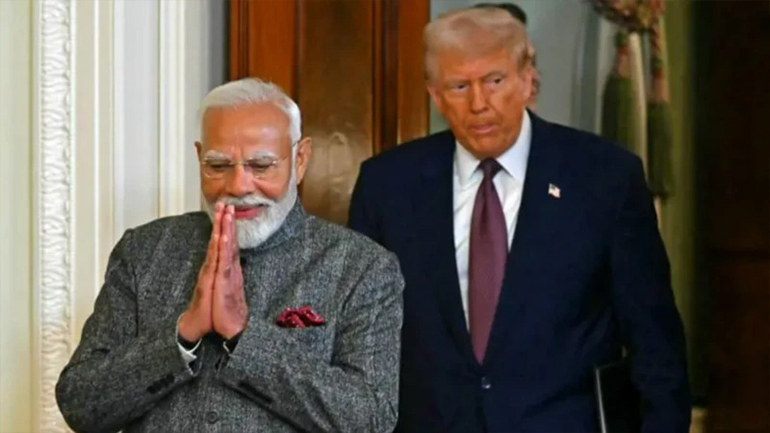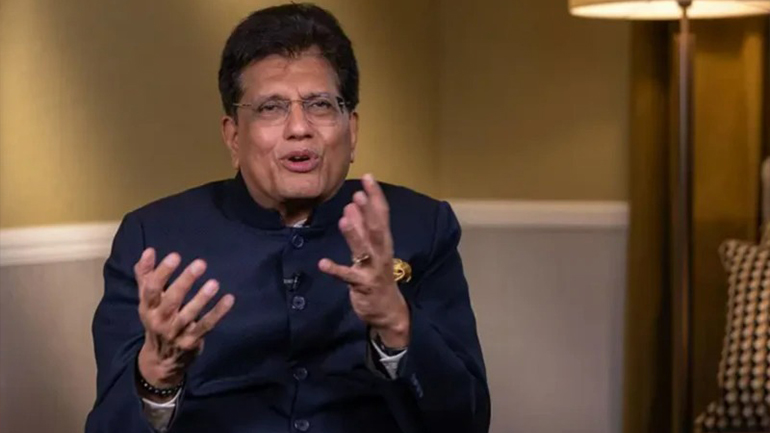

It wasn’t too long ago when US President Donald Trump and Indian Prime Minister Narendra Modi stood side by side at the ‘Howdy Modi’ rally in Houston, addressing thousands. During the event, they shook hands, hugged, and delivered powerful speeches emphasizing shared values and global leadership. That moment was seen as the peak of the US-India partnership. But now, it feels like a forgotten chapter. Just seven months into Trump’s second term, the relationship has shifted toward confrontation. The two strategic allies are now edging toward a trade war. Last week, Trump imposed a 25% tariff on imports from India, a move seen as harsh. But on August 4, he went further, threatening to impose “much higher” tariffs. Trump stated that India is buying too much oil from Russia, effectively funding the ongoing war in Ukraine. He also criticized India’s trade behavior, saying, “They trade a lot with us, but we don’t trade with them.” Many observers were surprised when India responded with strong language, with the Modi government calling it “Western hypocrisy.” India argued that Western nations, including the US and the EU, continue to trade with Russia in sectors ranging from natural gas and fertilizers to machinery and metals. An Indian official stated, “The country will take all necessary steps to protect its national interests and economic security.”
Trump's pressure on India over trade is viewed by many as highly strategic. Despite global challenges and persistent inflation, India's economy has been performing remarkably well. Its foreign exchange reserves have surged past $645 billion, the rupee remains stable, and India has overtaken China to become the largest exporter of smartphones to the US. However, analysts believe that India’s rapid growth has made it a target for what some call “tariff extortion.” According to Michael Kugelman, a South Asia expert based in the US, Trump’s attacks appear somewhat personal. He noted, “Trump is displeased with the Indian government... The Indian negotiating team refused to accept all of the US's trade demands during recent talks.” Kugelman believes Trump’s frustration also stems from Modi’s refusal to credit him for the recent India-Pakistan ceasefire, as well as Modi’s firm stance during a tense phone call. “That might explain why Trump is targeting India more aggressively than even China or other major Russian oil buyers,” he said. The truth is, India’s oil trade with Russia is no secret—it’s an open fact. India’s Ministry of External Affairs has stated that global market conditions have necessitated such imports. They emphasized that European countries themselves are deeply involved in Russian trade, importing fertilizers, steel, and machinery. India is simply doing what is required to keep energy prices low and inflation in check, the ministry said.

Kugelman believes Trump's anger stems from Modi's refusal to give credit for the recent ceasefire between India and Pakistan and his strong stance during a tense phone call.
Recently, US Secretary of State Marco Rubio also spoke in a carefully measured tone. He acknowledged that India is a “strategic partner” and, while criticizing India's discounted oil purchases from Russia, he also recognized India's energy needs. He stated, “Like every country, they have to strengthen their economy. There are sanctions on Russian oil, and it’s cheap.” The real question now is: How long can India withstand this growing pressure? According to Dr. Bajpai of Chatham House in London, while the US remains a key trade partner, India’s economy—like other major economies—is not solely dependent on trade. Experts believe that India must rely not only on its economic resilience but also on strategic clarity to navigate this situation. Steve Hanke, a professor of Applied Economics at Johns Hopkins University, who also served on President Ronald Reagan’s Council of Economic Advisers, gave a sharp assessment. He remarked, “President Trump can shake your hand in the morning and stab you in the back at night.” Professor Hanke believes that India should avoid an emotional reaction and instead follow Napoleon’s old advice: if your enemy is making a mistake, don’t interrupt them.
Amid all this, another battle is unfolding—a conflict that could strike at the heart of India’s rural economy. According to inside sources, President Trump’s team is pressuring India to open its dairy and agricultural sectors to American businesses. But for India, this is not just a trade issue. The agriculture sector is politically sensitive, socially complex, and economically vital, with over 40% of Indian citizens dependent on farming for their livelihoods. Opening the market to heavily subsidized U.S. agricultural products could flood the Indian market and cripple small farmers, who already operate under significant stress. The memory of the 2020–21 farmers’ protest still lingers in Prime Minister Modi’s mind. That movement had forced the government to repeal controversial farm laws, marking a rare political retreat. Conceding now would not only be an economic risk but could also trigger political backlash, especially ahead of any electoral season.
For now, India's strategy is to maintain a delicate balance. New Delhi continues negotiations quietly without offering the U.S. any explicit concessions. According to Kugelman, India will likely hold its ground even under intense U.S. pressure. He stated, “India must be careful not to give too many trade concessions to the U.S. due to its domestic political constraints. This won’t be an easy compromise.” India has increased oil imports from the U.S. and the Middle East, distanced itself from Iran and Venezuela, and heavily invested in alternative energy sources—a clear sign of strategic diversification in energy policy. But the real crisis goes beyond just bilateral trade disputes. Trump’s tariff decisions have significantly undermined the role of the World Trade Organization (WTO), which once served as a key institution for resolving international trade disputes. Now, it is almost dysfunctional. An Indian official remarked, “There was a time when trade was handled through negotiations. Now, it’s all about intimidation.” Professor Steve Hanke believes that Trump’s entire trade strategy is fundamentally flawed. He argues that the logic behind Trump’s trade war is like a house of cards—unsustainable in the long run. With the U.S. economy slowing and edging toward recession, Hanke warns that “this fear may soon start influencing U.S. policymaking.”

Experts say India has refused to accept all of the US's demands in ongoing trade deal negotiations.
Despite all of Washington’s threats, India is far from weak. With a strong digital economy and a rapidly expanding consumer base, India is not easily intimidated. Dr. Bajpai states that in its pursuit of strategic autonomy, India will continue to engage with all major global powers—not just the West, but also China, Russia, and the Global South. India’s economic growth remains a beacon of hope. Inflation is at its lowest level in six years, employment opportunities are increasing, and with exports holding steady, the Indian economy is making a steady recovery.
Why has Trump turned against Modi, the same leader he once greeted with a warm handshake? Looking back, the signs of a breakdown in Trump-Modi relations were already visible. Diplomacy experts had warned against prioritizing personal diplomacy over the complexity of bilateral ties. While the media celebrated the Modi-Trump friendship, it failed to reflect the intricate realities of India-US relations. In politics, personal relationships rarely hold weight. Trump’s politics leaves little room for emotion. As Dr. Bajpai puts it, “In Trump's foreign policy, there is no such thing as friend or foe.” He believes this tension is largely due to India’s disagreement with Trump over oil and trade issues. So, what should India do now? Professor Hanke suggests that India should shift focus toward countries interested in free trade agreements and strategic trade partnerships, rather than relying on unpredictable alliances.
Powered by Froala Editor